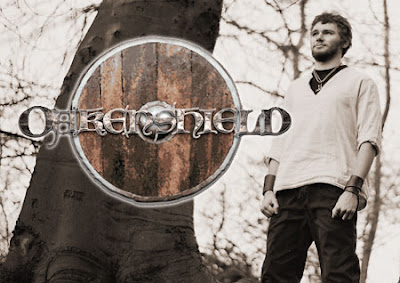English text
Martín: Hello Ben! First of all present us your project OAKENSHIELD and its main concept.
Ben: Oakenshield is the follow-up to my former project Nifelhel which began life in 2004 as a Viking metal studio project, influenced by the likes of Bathory, Amon Amarth and Thyrfing. Two CD’s were self-released under this name, and in 2007 it was decided that there would be a name change for the project. With this came a natural change of course in musical direction as well, evolving into a more epic, atmosphere-based sound, with keyboards playing a dominant role as well as traditional instruments – recorder and violin.
M: Why a one-man-band?
B: The project started simply as a pastime, something I began as I got into home recording and the studio aspect of music. From there I began writing more songs in the same style and eventually decided to compile them into a project. I enjoy working as a one-man-band as it gives me a chance to write music that is entirely my own, that I enjoy playing and listening to.
M: Your debut album “Gylfaginning”is such an atmospheric trip to the ancient and the dark side. Why this connection between the dark and the past?
B: I suppose one of the reasons music written about ancient times is dark is due to the romanticism and imagery we have of the past. Even though we know a lot about the events that took place thousands of years ago, there is still a great sense of mystery, and in one’s mind that mystery could become quite eerie. On “Gylfaginning”, I think this mysterious side of history is represented well by dark sounding music.
M: Where do you find inspiration to write the lyrics?
B: All the lyrics for “Gylfaginning” were inspired by the book of the same name (the first book of the Prose Edda, written by Snorri Sturluson). The lyrics are entirely inspired by this text, with some passages taken directly from the book. The concept deals with the world of Norse mythology, from the beginning of the world (Ginnungagap) to the destruction (Vigrid).
M: Can we learn from ancient mythology in our times? Is there a message you want to transmit with those tales?
B: Like with all religion, people can learn what they want from ancient mythology and apply it to their lives in their own way. I myself am not personally religious, but have a great respect for the ancient beliefs, as these were in place long before Christianity in Europe. Everything in the ancient mythologies (Norse/Germanic, Greek, Roman etc) relates to something in the present day – everything has a meaning and relevance to our earth.
M: How it is the process to compose this kind of music with epic feelings and dark sounds?
B: When composing this album, the process I undertook was to literally read the part of the book I wanted to write about, and imagine what the music should sound like in my head as I read it. I think this is what makes “Gylfaginning” special – many of the songs do not have clear set structures, they move along their own paths to tell the story as it happens. For example, each section of music relates to the events of the tale, there are little set forms such as ‘verse-chorus-verse-chorus-middle-chorus’ and so forth. The music was generally written before the lyrics, although at times I would pick out a poetic passage from the Edda that I knew I wanted to appear in a certain song, and make sure I wrote a fitting musical section for it.
M: Can you choose two bands or artists with different styles that influenced you to be a musician?
B: Since a very early age I have always been interested in making music, before I even understood what notes were I had a clear idea of how good music was written – I would make up songs in my head but could only sing them. When I was around 10 a school friend got me into bands like System of a Down and Korn, and it was then that I realised I wanted to play drums. When I was 11 I got my first instrument – a drum kit, and a couple of years later I picked up guitar by messing around on my brother’s electric, playing simple riffs from bands like Green Day. I think it was Metallica that truly inspired me to become a musician, as I could not read or write music before I began studying it at school – a subject the music of Metallica had taught me to appreciate a lot more. Obviously studying music introduced me to classical music, and it was the discovery of ‘how music worked’ that inspired me to write music based on chords and tonality rather than simple guitar riffs etc.
M: How do you feel about the Pagan Metal scene in our days?
B: It’s great that so many people are now listening to Viking/folk metal, but it has the potential to become a genre too overrun for the really talented groups to become recognised. On the plus side, Europe and the UK in particular has seen a massive boom for the genre in the last year, after several tours by bands such as Ensiferum, Turisas, Korpiklaani etc. This is a brilliant thing as it means the long-term fans of the genre are finally getting to see their favourite bands without having to travel, and it has also brought UK Viking/folk metal bands together – there are now small folk metal festivals being organised to promote the scene in England, which is great. Overall, the worldwide pagan metal scene is really being brought to life by new bands and artists, without leaving the veterans behind.
M: Thank you very much for your time. Here you have space to write what you want as farewell.
B: Thanks for the great questions. To the readers – keep supporting the scene! Cheers!
http://www.myspace.com/oakenshielduk
http://www.oakenshield.org
Nuevo single de THE BLACKTONES
-
La banda de Sludge Metal *THE BLACKTONES *han revela do el single *"Russian
Doll"*, último anticipo de su nuevo trabajo *"The Longest Year"* (6 de
septi...
Hace 1 año












No hay comentarios:
Publicar un comentario